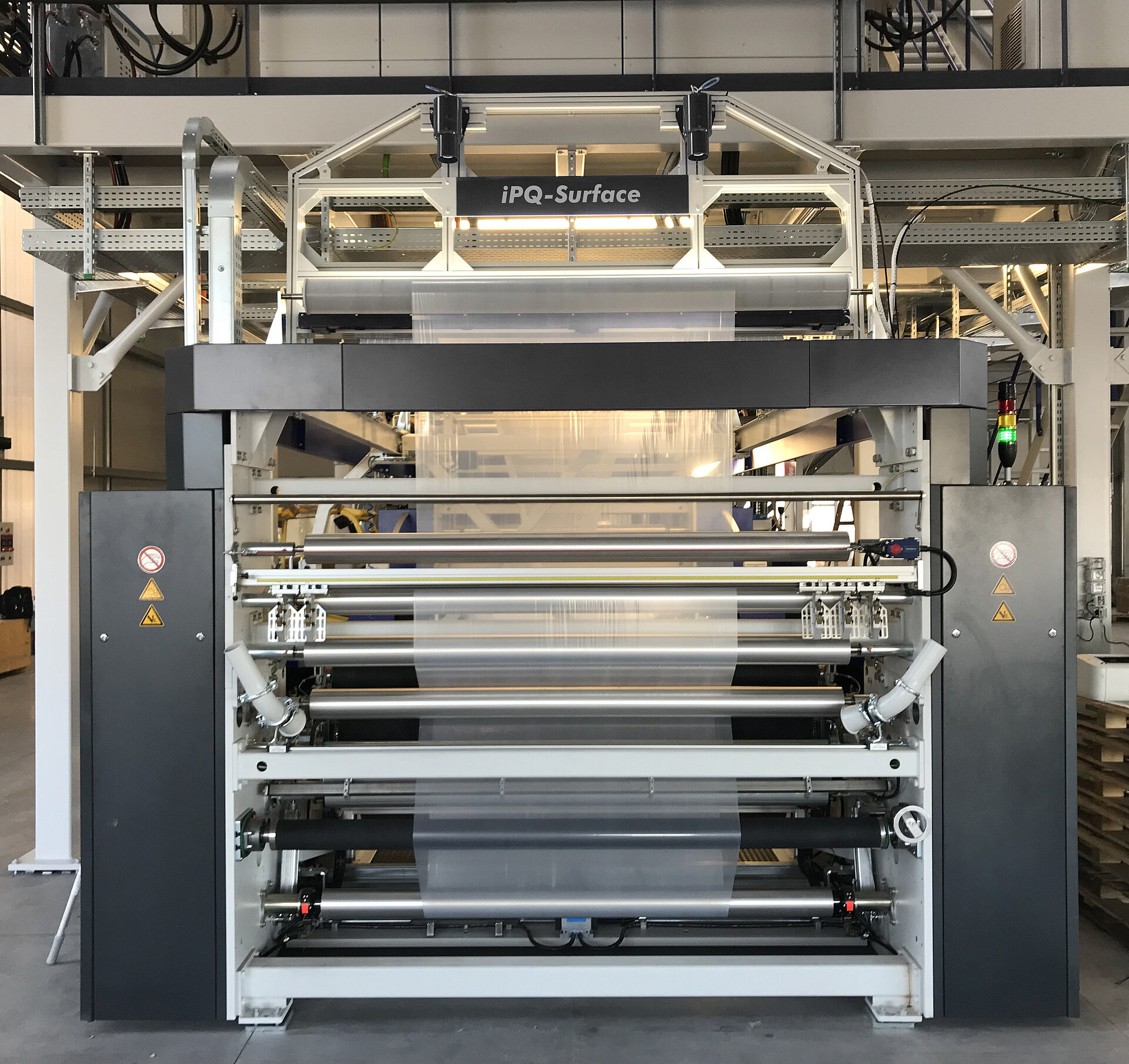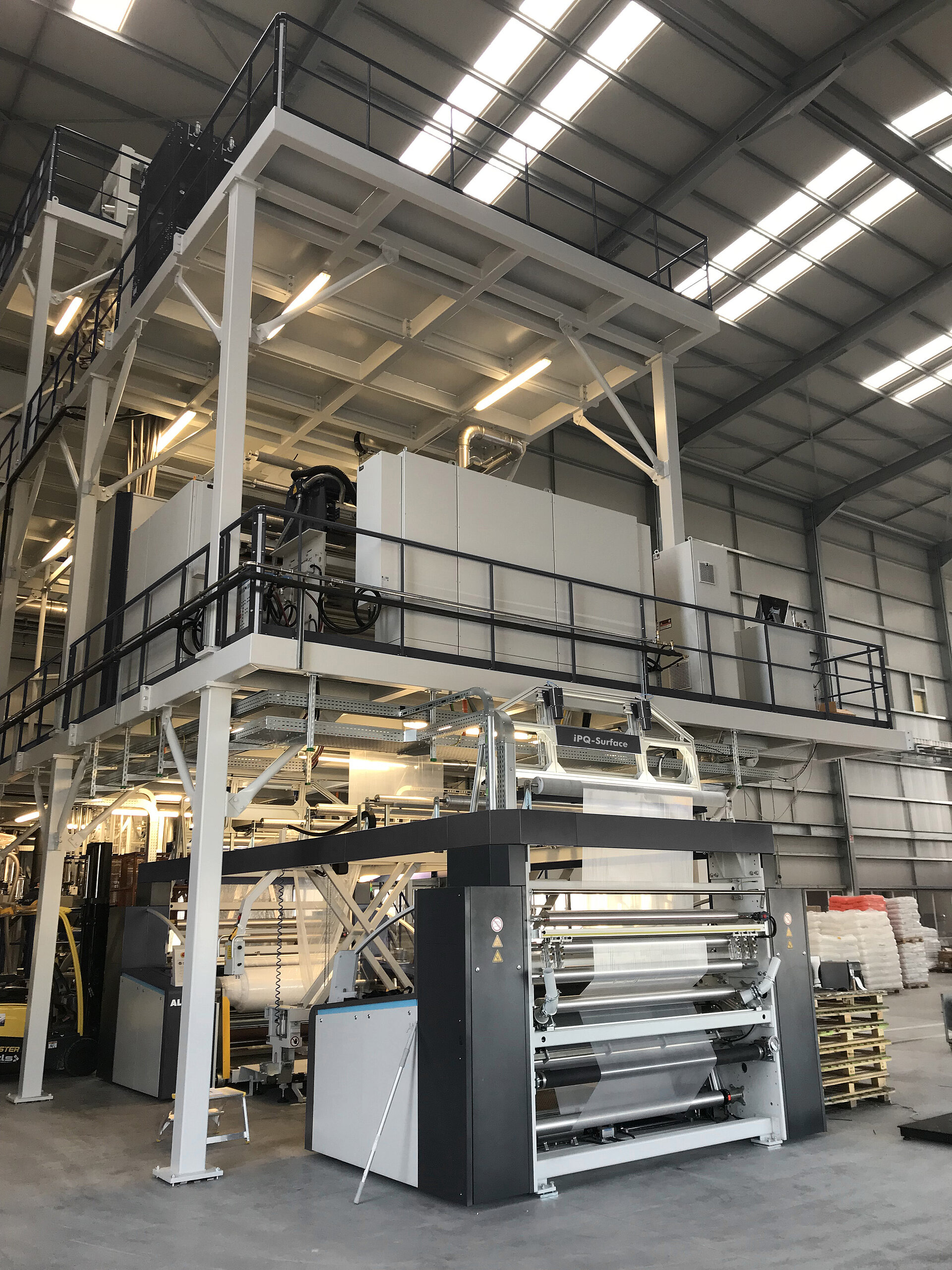Founded in 1967 as a manufacturer of printed bags and pouches, Termoplast today specializes in the production of sustainable MDO-PE films for all printing technologies and special applications in the food, hygiene, medical and pharmacology sectors. Termoplast, an Adapa Group company, manufactures its high-quality, sustainable film products in two independent production facilities covering an area of 26,500 m2 at its site near Florence. "A prerequisite for the high standard of Termoplast products, and the maximum satisfaction of our customers, is to ensure perfect raw material quality," explains Lorenzo Barnini, Technical Sales Manager and son of the founding Barnini family. "In order to eliminate potential defects and color deviations already during film extrusion, and to make our production processes even more economical in this way, we were looking for a solution to upgrade our rewinders and blown film extruders with an inspection system." The decision-makers selected BST's iPQ-Surface surface inspection systems, which can reliably detect and classify defects in film extrusion 100 percent of the time by networking state-of-the-art hardware and smart software, and document them for future process optimization. The inspection systems were used on two rewinders and six blown film extruders at the plant.
State-of-the-art technology for reliable defect detection
The new inspection system had to be able to detect and document all typical defects in film extrusion, such as specks, gel particles, streaks, and insects, and eliminate them in subsequent processes. This required a high insensitivity of the software with respect to the natural light fluctuations of the environment ahead. The solution for all these requirements: the iPQ-Surface surface inspection system from BST. Due to its modular design, the individually adaptable system is also well-suited for retrofitting and could be seamlessly integrated into Termoplast's existing infrastructure. BST also provides industry-specific solutions, such as iPQ-Surface Energy for battery and fuel cell production and iPQ-Surface Coldseal for printing and packaging. With up to 300KHz line frequency at up to 16384 pixels, iPQ-Surface meets the very highest requirements even in the tightest of spaces. With innovative modular multiplex illumination, the powerful technology can combine the most diverse types of illumination (RGB or UV illumination, brightfield, darkfield, sidelight or (transmitted light) and perform tasks that previously required multiple inspection lines with a single inspection line. The most recent addition to iPQ-Surface is a specially developed extra module for detecting color deviations. "This allows even the slightest discoloration to be detected 100 percent reliably and a DeltaE deviation to be displayed and tracked," explains Jan Jostmeier, product manager for iPQ-Surface. "Warning thresholds can be used to generate alarm messages for the operator, for example." iPQ-Surface also provides a significant advantage in the processing of recycled materials, which is the core business of the adapa Group manufacturer Termoplast: The specks that occur frequently here are ignored and are not reported as defects; only relevant defects are displayed.
Long-term process optimization thanks to smart software
In addition to the state-of-the-art hardware components, iPQ-Surface's smart software contributes to long-term quality optimization, scrap reduction and increased process efficiency. This is capable of classifying, documenting and evaluating the defect data collected during the manufacturing process in order to improve production standardization. "When using new software, one factor is essential: it must be easy and intuitive to use," Barnini reports. "That is the case with iPQ-Surface. Our employees enjoy working with it, and even if there is a change in personnel, it always ensures quality that is independent of operation." The software's KI-based classifiers separate the defects according to type and severity to draw the right conclusions for process optimization. Users can also control defect detection according to individually adjustable quality classes, depending on whether 100 percent defect-free quality is desired or a lower quality is sufficient for further processing of the films. Quality data can be analyzed for long-term production optimization thanks to seamless digital documentation of quality and meaningful statistical evaluations such as roll and quality logs.
iPQ-Surface as part of the sustainability concept
Sustainability and resource conservation are among the cornerstones of the adapa Group company Termoplast. In addition to its own recycling plant to implement a "zero waste" strategy, the modern sustainability concept also includes an impressive 5,000 m² photovoltaic system. "The highly efficient iPQ-Surface surface inspection systems now complete our concept by detecting defects in real time during the production process. This enables the machine operator to intervene immediately, preventing material waste before it occurs," explains Lorenzo Barnini. "Over time, this has allowed us to significantly reduce the amount of defective material - benefiting the environment and also ensuring customer satisfaction in the long term."
Close cooperation with BST
Prior to the installation and commissioning of the eight surface inspection systems, the Italian BST subsidiary recorded all necessary data from the rewinders and extruders during an on-site visit, and the positioning of the inspection system was decided in collaboration with the customer. The designs and layouts of the lines from the extruder suppliers were used and compared with the actual conditions on site. The final assembly of the iPQ surface systems was carried out in cooperation with Termoplast's technicians. "BST supported us from the very first beginning in defining the machine configuration to meet the detailed targets for defect detection," Barnini explains. "BST also worked closely with us on the entire project definition in terms of layout, drawings and specifications." BST's international orientation, combined with a large network of regional contacts, makes it possible it to respond quickly and personally when advice and support are required: "This enables us to provide the best possible support to our customers worldwide and to offer responsive support, even on site, in the event of questions or problems," reports Jan Jostmeier. "If things need to go even faster, our experts can access the installed iPQ surface systems directly via remote access service."
Conclusion
With the installation of iPQ-Surface, Termoplast as an adapa Group company chose a system from BST for the first time. "The number of inspection systems installed speaks for itself," says Barnini. "We are highly satisfied with our choice and would choose BST again any time." Thanks to reliable defect detection with iPQ-Surface, Termoplast has been able to effectively reduce material scrap on its rewinders and blown film extruders, increasing the sustainability and profitability of its production processes. This also reduced the number of customer complaints and increased customer satisfaction, both of which are critical for long-term market success and stability. "With the help of iPQ-Surface, we always have the quality of our products in view. The data supplied from the system flows into internal statistics and process evaluations and helps us develop new and innovative products," reports Barnini. "The new iPQ-Surface systems thus form an indispensable part of our production processes and support us every day in supplying our customers with only the most excellent and highest-quality film products."


